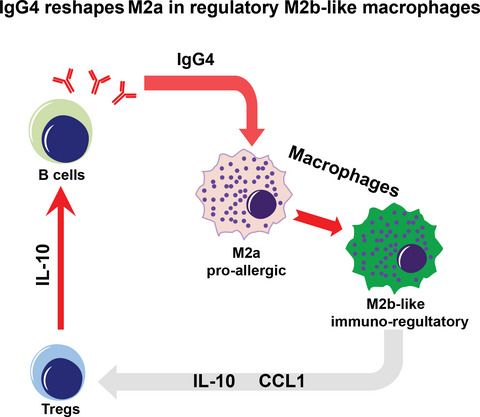Release date:2019-07-31

Allergy
[IF:6.048]
IgG4 drives M2a macrophages to a regulatory M2b-like phenotype: potential implication inimmune tolerance
DOI: 10.1111/all.13635
Abstract:
Background: Macrophages can be converted in vitro into immunoregulatory M2b macrophages in the presence of immune complexes (ICs), but the role of the specific subclasses IgG1 or IgG4 in this phenotypic and functional change is not known.
Methods: Monocyte-derived macrophages (MDMs) were treated with M-CSF, followed by IL-4/IL-13 to induce the M2a allergic phenotype. To mimic unspecific or allergen-specific ICs, plates were coated with myeloma IgG1 or IgG4, or with grass pollen allergen Phl p 5 followed by recombinant human Phl p 5-specific IgG1 or IgG4. M2a polarized macrophages were then added, cultured and examined for cellular markers and cytokines by flow cytometry, ELISA, and rtPCR. Alternatively, immune complexes with IgG1 or IgG4 were formed using protein L.
Results: IgG4 ICs down-regulated CD163 and CD206 on M2a cells, and significantly increased IL-10, IL-6, TNF and CCL1 secretion, indicating a shift to an M2b-like phenotype. Treatment with IgG4 ICs resulted in expression of FcgRII and down-modulation of FcgRII compared to IgG1 treated cells (p=0.0335) or untreated cells (p < 0.00001).
Conclusion: Immune complexes with subclasses IgG1 and IgG4 can in vitro be generated by plate
absorption, and in fluid form by protein L. Crosslinking of FcgRIIb by the IgG4 subclass redirects proallergic M2a macrophages to an M2b-like immunosuppressive phenotype. This suggests an interplay of macrophages with IgG4 in immune tolerance, likely relevant in allergen immunotherapy.
First Author:
Rodolfo Bianchini
Correspondence:
The Interuniversity Messerli Research Institute, University of Veterinary Medicine Vienna, Medical University of Vienna, Dept. of Comparative Medicine (Vienna,Austria)
All Authors:
Rodolfo Bianchini, Franziska Roth-Walter, Anna Ohradanova-Repic, Sabine Flicker, Karin Hufnagl,Michael Bernhard Fischer, Hannes Stockinger ,Erika Jensen-Jarolim
2019-06-27 Article
 杭州浙大迪迅生物基因工程有限公司
杭州浙大迪迅生物基因工程有限公司
